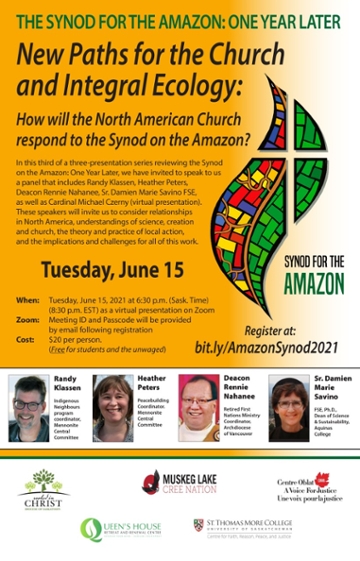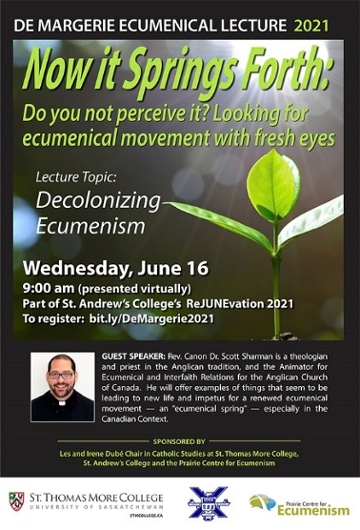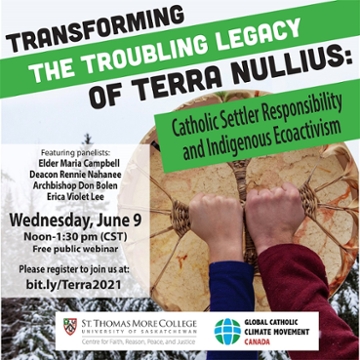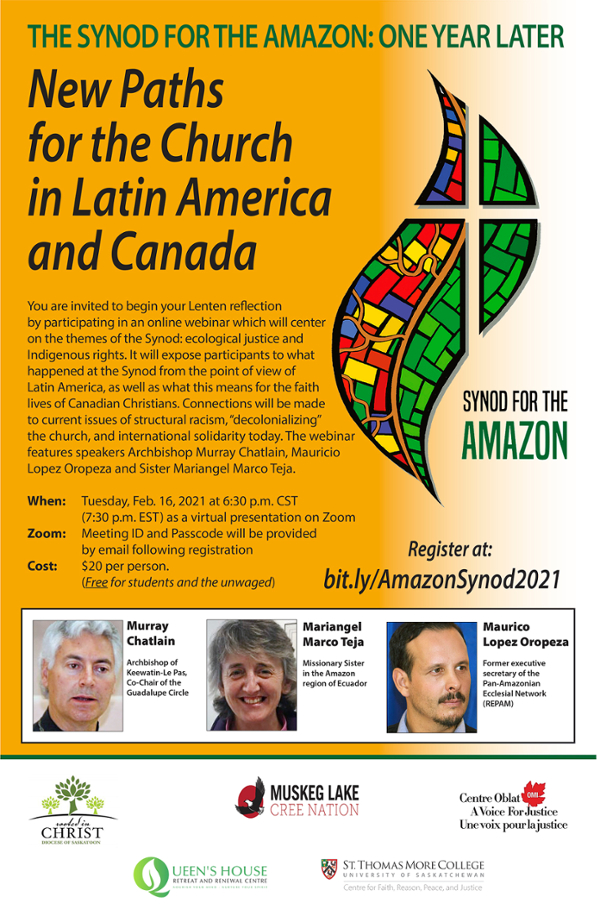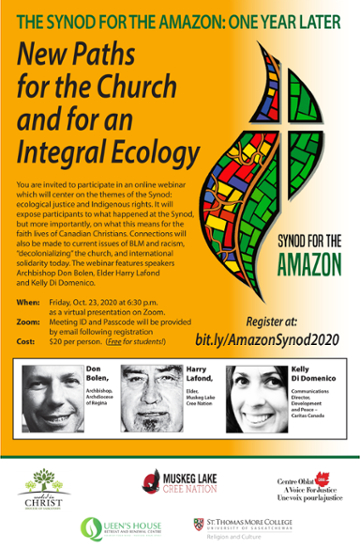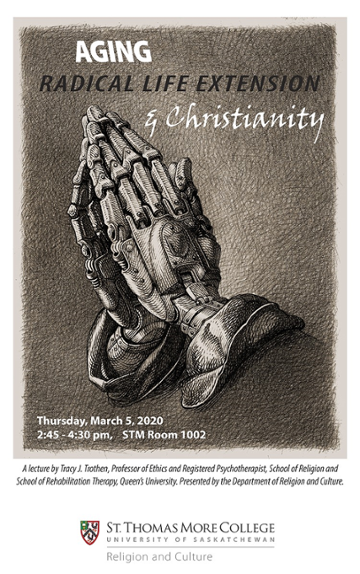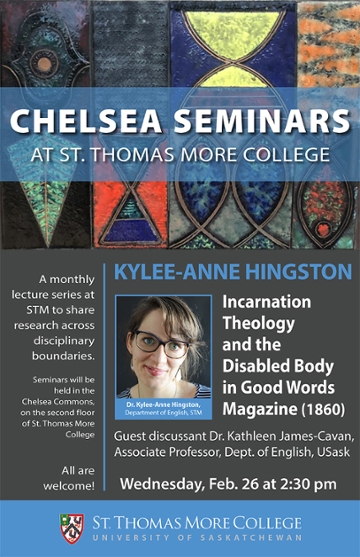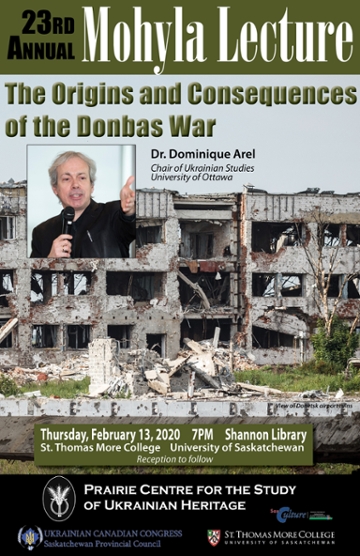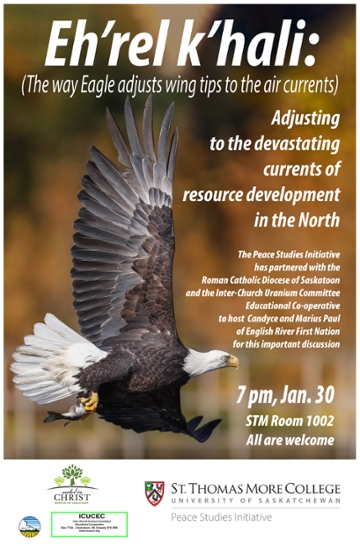Conferences & Lectures
STM hosts several lecture series such as the Keenan Memorial Lecture, Mohyla Lecture, and the De Margerie Ecumenical Lecture. To inquire about lectures or conferences held at the college, please review the College Event Calendar or contact the College Main Office
Archive by Academic Year
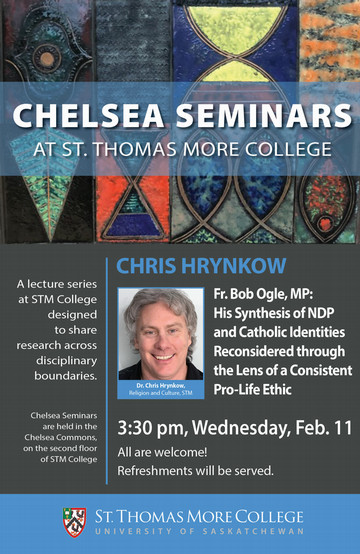
Fr. Bob Ogle, MP’s Synthesis of NDP and Catholic Identities Reconsidered through the Lens of a Consistent Pro-Life Ethic
Dr. Chris Hrynkow, Department of Religion and Culture
Chelsea Seminar Series
Wednesday, February 11, 2026, 3:30pm
STM Chelsea Commons
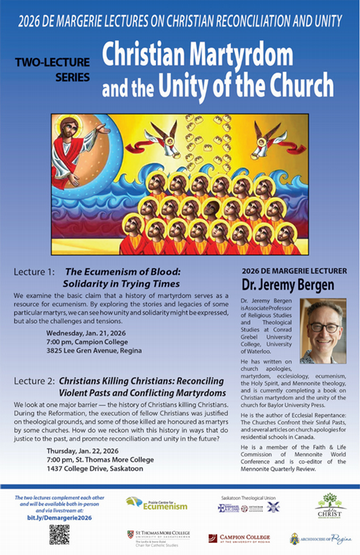
Christian Martyrdom and the Unity of the Church
Two-lecture series
Dr. Jeremy Bergen, Conrad Grebel University College, University of Waterloo
De Margerie Series on Christian Reconciliation and Unity
Campion College, University of Regina and St. Thomas More College
January 21 and 22, 2026
Watch a recording of "The Ecumenism of Blood: Solidarity in Trying Times"
Watch a recording of "Christians Killing Christians: Reconciling Violents Pasts and Conflicting Martyrdoms"
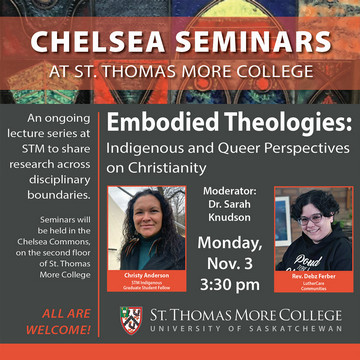
Embodied Theologies: Indigenous and Queer Perspectives on Christianity
With Christy Anderson and Debz Ferber. Moderated by Dr. Sarah Knudson.
Chelsea Seminar Series
Monday, November 3, 2025
STM Chelsea Commons
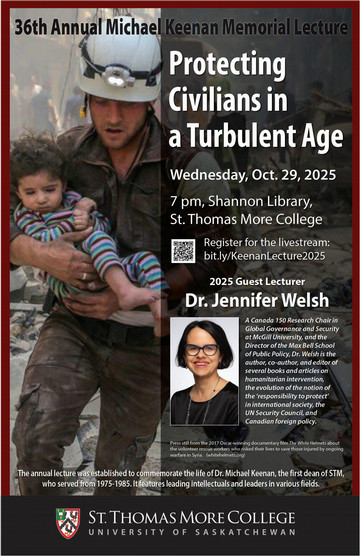
Protecting Civilians in a Turbulent Age
Dr. Jennifer Welsh
36th Michael Keenan Memorial Lecture
Wednesday, October 29, 2025, 7:00pm
Shannon Library, STM
Watch a recording of the livestream
Read a copy of the printed lecture
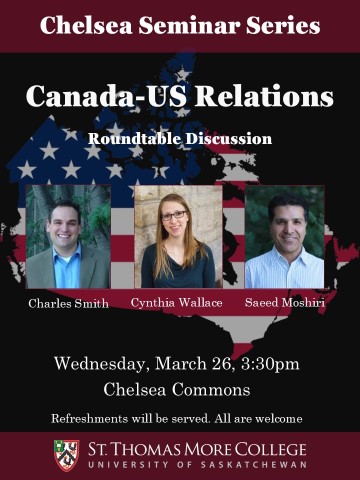
Canada-US Relations: Roundtable Discussion
With Dr. Charles Smith, Dr. Cynthia Wallace, and Dr. Saeed Moshiri
Chelsea Seminar Series
Wednesday, March 26, 3:30pm
STM Chelsea Commons
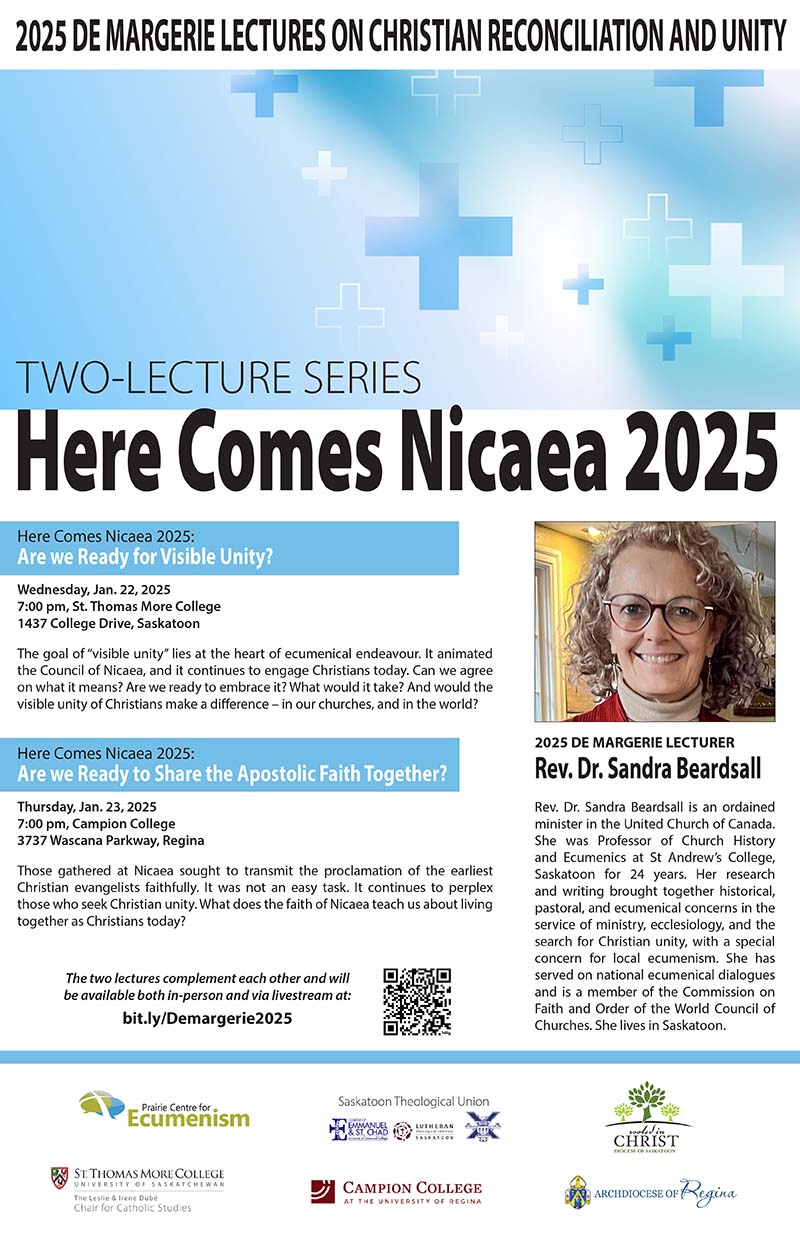
Here Comes Nicaea 2025
Two-Lecture Series
De Margerie Series on Christian Reconciliation and Unity
Rev. Dr. Sandra Beardsall
January 22 and 23, 2025
Watch a recording of "Are We Ready for Visible Unity?"
Watch a recording of "Are We Ready to Share the Apostolic Faith Together?"
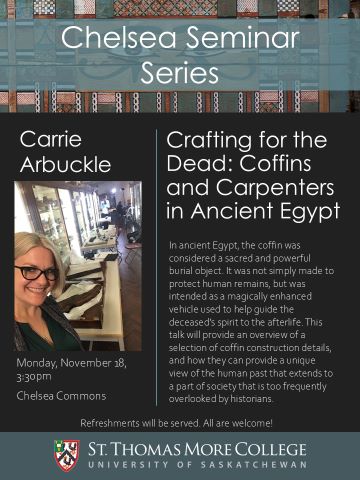
Crafting for the Dead: Coffins and Carpenters in Ancient Egypt
Dr. Carrie Arbuckle, Department of History
Chelsea Seminar Series
Monday, November 18, 2024, 3:30pm
STM Chelsea Commons
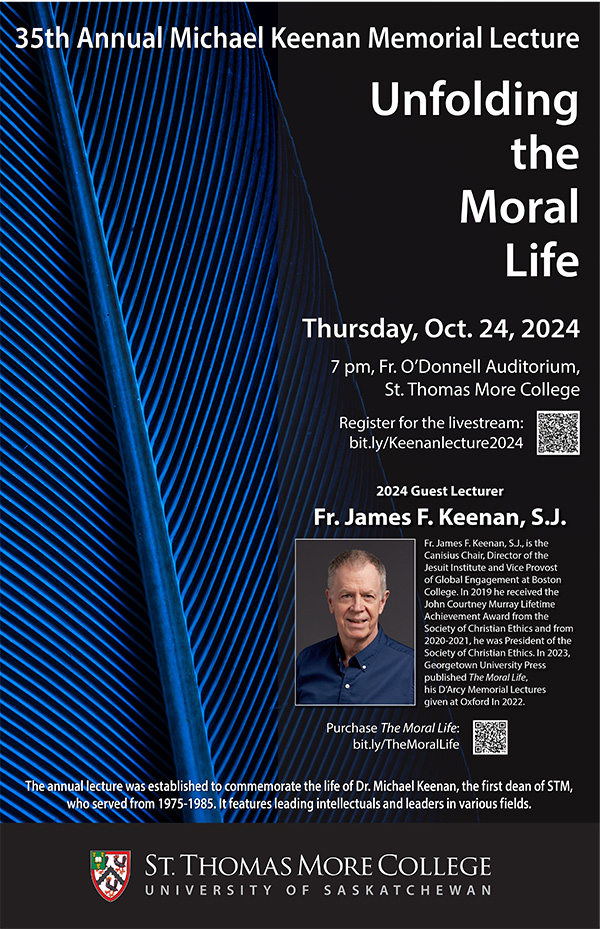
Unfolding the Moral Life
Fr. James F. Keenan, S.J.
35th Michael Keenan Memorial Lecture
Thursday, October 24, 2024, 7:00pm
Fr. O'Donnell Auditorium, STM
Watch a recording of the lecture
Read a copy of the printed lecture
Purchase a copy of The Moral Life: Eight Lectures
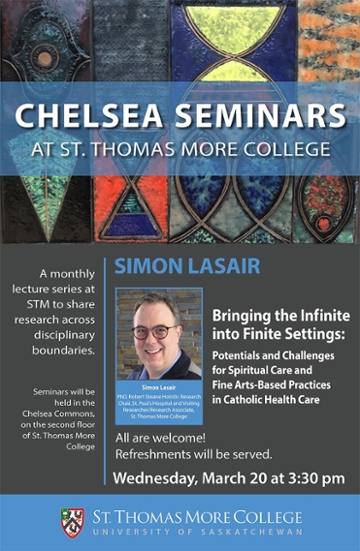
Bringing the Infinite into Finite Settings: Potentials and Challenges for Spiritual Care and Fine Arts-Based Practices in Catholic Health Care
Dr. Simon Lasair
Chelsea Seminar Series
Wednesday, March 20, 2024
STM Chelsea Commons
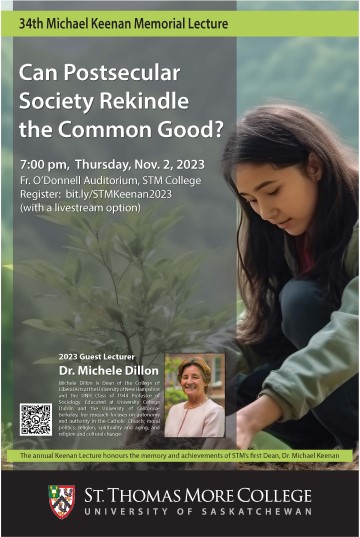
Can Postsecular Society Rekindle the Common Good?
Dr. Michele Dillon
34th Michael Keenan Memorial Lecture
Thursday, November 2, 2023, 7:00pm
Presented by St. Thomas More College
View a recording of the livestream
Read the published version of the lecture

Music, Meaning and World
Dr. Daniel Regnier with Special Guests Elixir Ensemble
Chelsea Seminar Series
Wednesday, September 27, 2023
STM Chapel
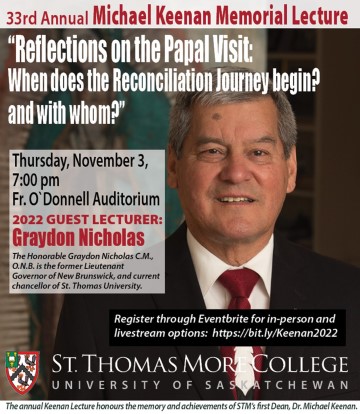
Reflections on the Papal Visit: When does the Reconciliation Journey Begin? And With Whom?
Hon. Graydon Nicholas
33rd Michael Keenan Memorial Lecture
Thursday, November 3, 2022, 7:00pm
Presented by St. Thomas More College
View a recording of the livestream
Read the published version of the lecture
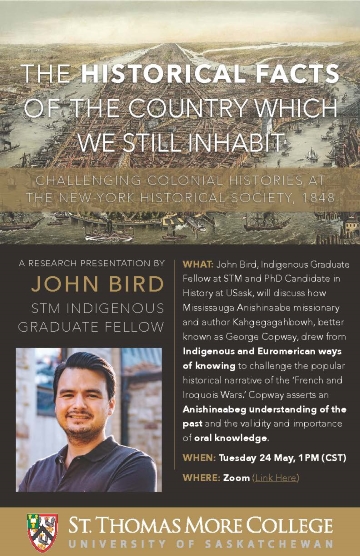
“The Historical Facts of the Country Which We Still Inhabit”: Challenging Colonial Histories at the New-York Historical Society, 1848
John Bird, STM Indigenous Graduate Student Fellow
Tuesday, May 24, 1pm
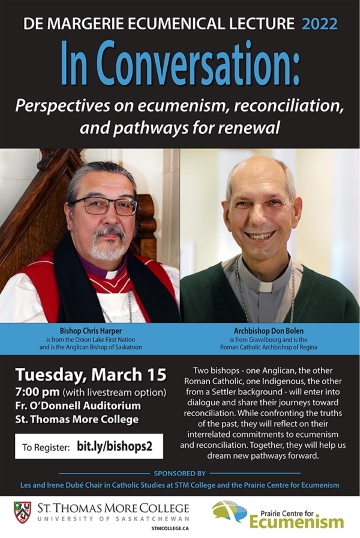
In Conversation: Perspectives on Ecumenism, Reconciliation, and Pathways for Renewal
Bishop Chris Harper and Archbishop Don Bolen
De Margerie Ecumenical Lecture
Tuesday, March 15, 2022, 7:00pm
Fr. O'Donnell Auditorium
Presented by the Les and Irene Dube Chair in Catholic Studies at STM and the Prairie Centre for Ecumenism
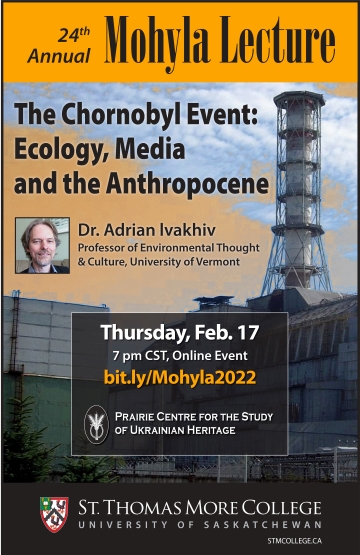
The Chernobyl Event: Ecology, Media and the Anthropocene
Dr. Adrian Ivakhiv
24th Annual Mohyla Lecture
Thursday, February 17, 2022, 7:00pm CST
Presented by the Prairie Centre for the Study of Ukrainian Heritage
bit.ly/Mohyla2022
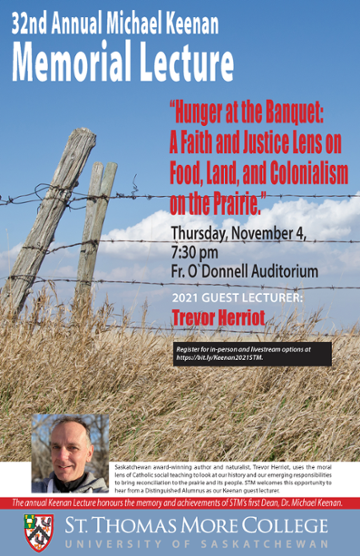
Hunger at the Banquet: A Faith and Justice Lens on Food, Land and Colonialism on the Prairie
Trevor Herriot
32nd Michael Keenan Memorial Lecture
Thursday, November 4, 2021, 7:30pm
Presented by St. Thomas More College
Watch a recording of the lecture on YouTube
Read the published version of the lecture
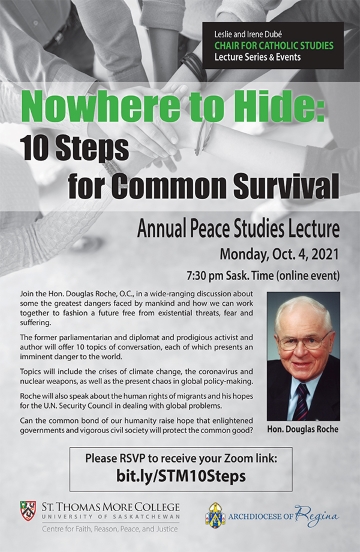
Nowhere to Hide: 10 Steps for Common Survival
Annual Peace Studies Lecture
Hon. Douglas Roche
Monday, October 4, 2021
Sponsored by the Les and Irene Dubé Chair in Catholic Studies
Co-hosted by the Archdiocese of Regina’s Social Justice Office and St. Thomas More College’s Centre for Faith, Reason, Peace, and Justice
Click here to watch a recording of the lecture on YouTube
SYNOD FOR THE AMAZON: New Paths for the Church in Latin America and Canada - an online webinar on Zoom. In this third of a three-presentation series reviewing the Synod on the Amazon, we have invited to speak to us a panel that includes Heather Peters, Randy Klassen, Deacon Rennie Nahanee, Sr. Damien Marie Savino FSN & Cardinal Michael Czerny (virtual presentation). These speakers will invite us to consider relationships in North America, understandings of science, creation and church, the theory and practice of local action, and the implications and challenges for this work. Tuesday June 15, 6:30 - 8:30 p.m Sask Time. $20 - general public. Free admission to students and those unwaged. Registration deadline: June 14. Links to Register are provided below:
Paid Registration: https://qh.retreatportal.com/events/f?p=101:2:8410138845504::::PROGRAM_ID:10206
Students/Unwaged: https://qh.retreatportal.com/events/f?p=101:2:8410138845504::::PROGRAM_ID:10207
Now it Springs Forth: Looking for Ecumenical Movement with Fresh Eyes - Decolonizing Ecumanism
De Margerie Ecumenical Lecture
Co-Hosted by St. Thomas More College, St. Andrew's College, and the Prairie Centre for Ecumenism
Rev. Canon Dr. Scott Sharman
Wednesday June 16, 9:00am CST
Register at: https://bit.ly/2Qj4K
Transforming the Troubling Legacy of Terra Nullius: Catholic Settler Responsibility and Indigenous Ecoactivism
STM Centre for Faith, Reason, Peace, and Justice
Wednesday, June 9, Noon-1:30pm CST
Register at: https://bit.ly/Terra2021
Click here to watch a recording of the webinar on YouTube
NEW DATE: Call for Papers: Islam, Peace, and Justice Conference, September 21 and 22, 2022
Click here to view the full Call For Papers
In order to help animate interest in Islamic Studies in Saskatchewan, the Centre for Faith, Reason, Peace, and Justice, and the Department of Religion and Culture at St. Thomas More College welcome abstract submissions for our upcoming conference examining issues at the intersections of Islamic traditions, peace, and social justice. This conference will bring together scholars working in both specific academic fields and across disciplinary boundaries.
To be considered for a 20-minute presentation in the conference program, please submit a 100 – 150 word abstract, along with a 100-word biography, and your current CV. Please submit all three items to chrynkow@stmcollege.ca by March 22, 2022. All those who submit these three items will be notified of the committee’s decision within a week of this date. Any questions may be directed to Christopher Hrynkow at chrynkow@stmcollege.ca.
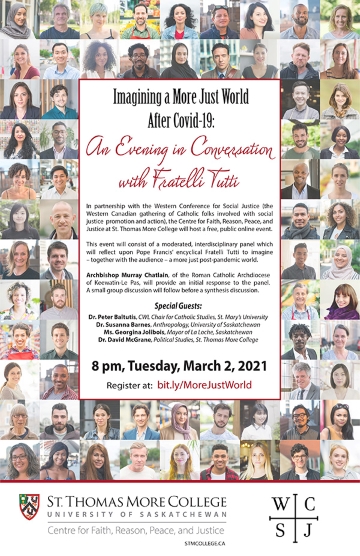
Imagining a More Just World After COVID-19: An Evening in Conversation with Fratelli Tutti
Tuesday, March 2, 2021, 8:00pm
Presented by the Centre for Faith, Reason, Peace, and Justice at STM and the Western Conference for Social Justice
Click here to watch a recording of this event on YouTube
The Synod for the Amazon: One Year Later
You are invited to begin your Lenten reflection by participating in an online webinar which will center on the themes of the Synod: ecological justice and Indigenous rights. It will expose participants to what happened at the Synod from the point of view of Latin America, as well as what this means for the faith lives of Canadian Christians. Connections will be made to current issues of structural racism, “decolonializing” the church, and international solidarity today. The webinar features speakers Archbishop Murray Chatlain, Mauricio Lopez Oropeza and Sister Mariangel Marco Teja.
Tuesday, Feb. 16, 2021 at 6:30 p.m. CST, (7:30 p.m. EST) as a virtual presentation on Zoom
Register at: bit.ly/AmazonSynod2021
The Synod for the Amazon: One Year Later
You are invited to participate in an online webinar which will center on the themes of the Synod: ecological justice and Indigenous rights. It will expose participants to what happened at the Synod, but more importantly, on what this means for the faith lives of Canadian Christians. Connections will also be made to current issues of BLM and racism, “decolonializing” the church, and international solidarity today. The webinar features speakers Archbishop Don Bolen, Elder Harry Lafond and Kelly Di Domenico.
October 23, 2020, 6:30pm
Register at: bit.ly/AmazonSynod2020
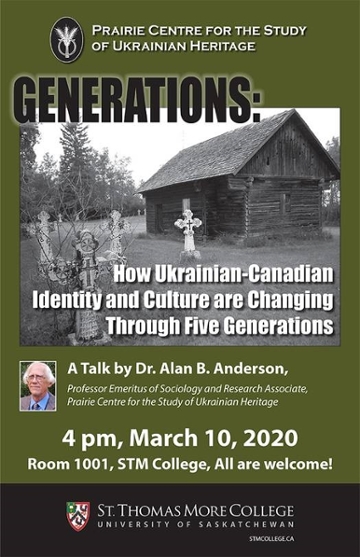
Generations: How Ukrainian-Canadian Identity and Culture are Changing Through Five Generations
Dr. Alan B. Anderson
March 10, 2020, 4pm
Room 1001, STM College
Presented by the Prairie Centre for the Study of Ukrainian Heritage
Aging Radical Life Extension and Christianity
Tracy J. Trothen, Queen's University
March 5, 2020, 2:45pm
STM Room 1002
Presented by St. Thomas More College Department of Religion and Culture
Incarnation Theology and the Disabled Body in Good Words Magazine (1860)
Chelsea Seminar Series
Kylee-Anne Hingston, STM Department of English
February 26, 2020, 2:30pm
Chelsea Commons
Presented by St. Thomas More College
The Origins and Consequences of the Donbas War
Dr. Dominique Arel, University of Ottawa
23rd Annual Mohyla Lecture
February 13, 2020, 7pm
Shannon Library
Presented by the Prairie Centre for the Study of Ukrainian Heritage
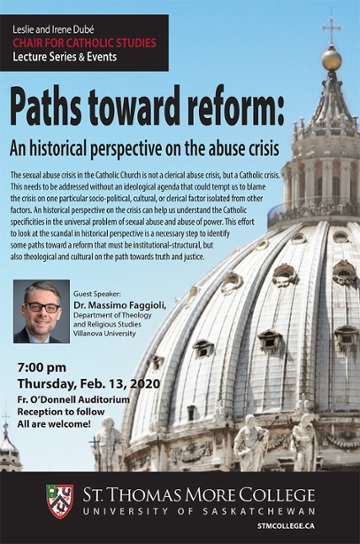
Paths Toward Reform: An Historical Perspective on the Abuse Crisis
Dr. Massimo Faggioli, Villanova University
Leslie and Irene Dubé Lecture Series
February 13, 2020, 7pm
Fr. O'Donnell Auditorium
Presented by St. Thomas More College
Eh’rel k’hali (The way Eagle adjusts wing tips to the air currents): Adjusting to the devastating currents of resource development in the North
Candyce and Marius Paul, English River First Nation
January 30, 2020, 7pm
STM Room 1002
Presented by St. Thomas More College Peace Studies Initiative, the Roman Catholic Diocese of Saskatoon, and the Inter-Church Uranium Committee Educational Co-operative
Call for Papers: Islam, Peace, and Justice Conference, September 21 and 22, 2020
Click here to view the full Call For Papers
In order to help animate interest in Islamic Studies in Saskatchewan, the Department of Religion and Culture at St. Thomas More College welcomes abstract submissions for our upcoming conference examining issues at the intersections of Islamic traditions, peace, and social justice. This conference will bring together scholars working in both specific academic fields and across disciplinary boundaries.
To be considered for a 20-minute presentation in the conference program, please submit a 100 – 150 word abstract, along with a 100-word biography, and your current CV. Please submit all three items to chrynkow@stmcollege.ca by April 6, 2020. All those who submit these three items will be notified of the committee’s decision within a week of this date. Any questions may be directed to Christopher Hrynkow at chrynkow@stmcollege.ca.
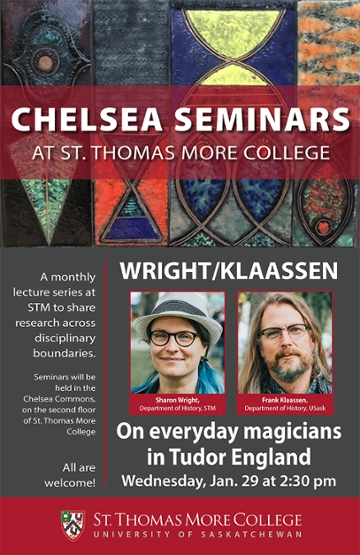
On Everyday Magicians in Tudor England
Chelsea Seminar Series
Sharon Wright, STM Department of History and Frank Klaassen, Department of History, USask
January 29, 2020, 2:30pm
Presented by St. Thomas More College
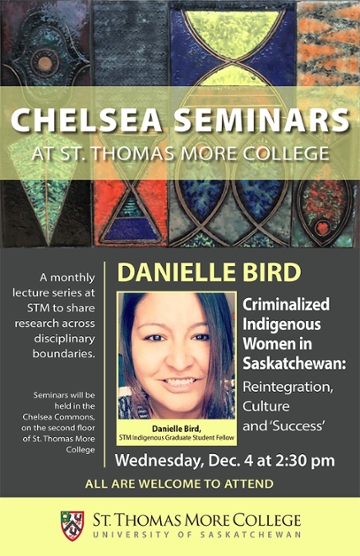
Criminalized Indigenous Women in Saskatchewan: Reintegration, Culture and 'Success'
Chelsea Seminar Series
Danielle Bird, STM Indigenous Graduate Student Fellow, 2018-2019
December 4, 2019, 2:30pm
Presented by St. Thomas More College
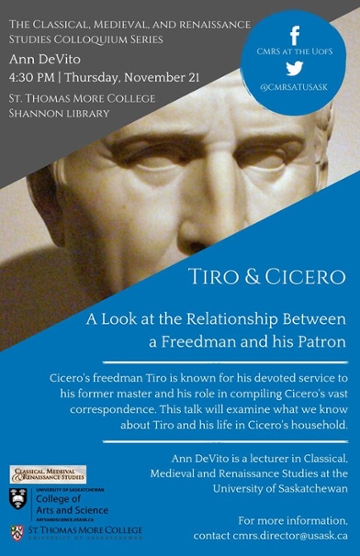
Tiro & Cicero: A Look at the Relationship Between a Freedman and his Patron
Classical, Medieval, and Renaissance Studies Colloquium
Ann Devito, Department of History, USask
November 21, 2019, 4:30pm
Shannon Library
Presented by St. Thomas More College and the U of S College of Arts and Science
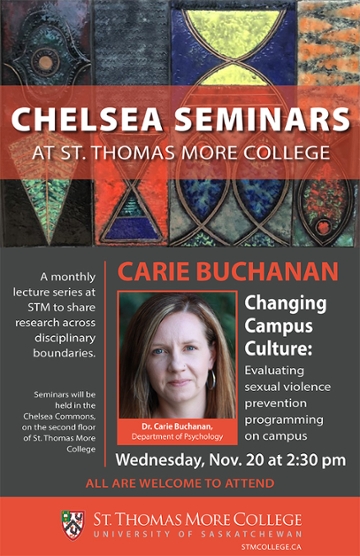
Changing Campus Culture: Evaluating Sexual Violence Prevention Programming on Campus
Chelsea Seminar Series
Carie Buchanan, STM Department of Psychology
November 20, 2019, 2:30pm
Presented by St. Thomas More College
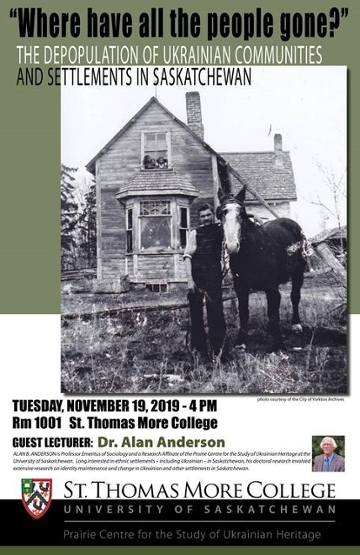
"Where have all the people gone?" The Depopulation of Ukrainian Communities and Settlements in Saskatchewan
Dr. Alan Anderson
November 19, 2019, 4pm
STM Room 1001
Presented by the Prairie Centre for the Study of Ukrainian Heritage
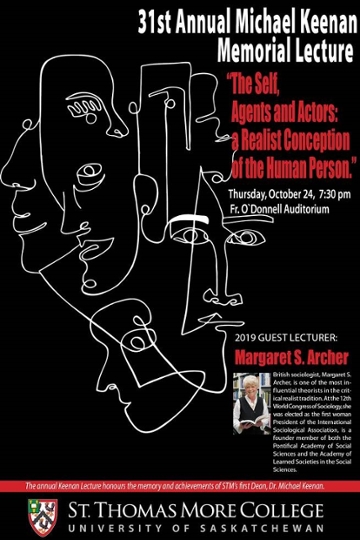
The Self, Agents and Actors: A Realist Conception of the Human Person
Margaret S. Archer, University of Warwick
31st Annual Michael Keenan Memorial Lecture
October 24, 2019, 7:30pm
Father O'Donnell Auditorium
Presented by St. Thomas More College
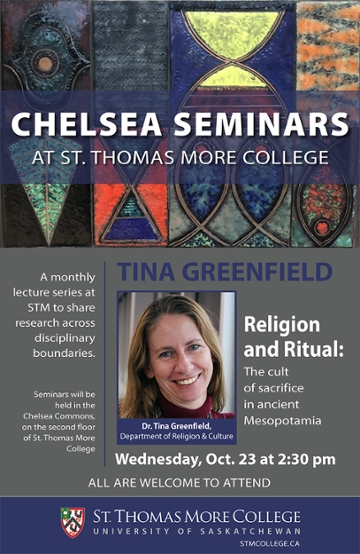
Religion and Ritual: The Cult of Sacrifice in Ancient Mesopotamia
Chelsea Seminar Series
Tina Greenfield, STM Department of Religion and Culture
October 23, 2019, 2:30pm
Presented by St. Thomas More College
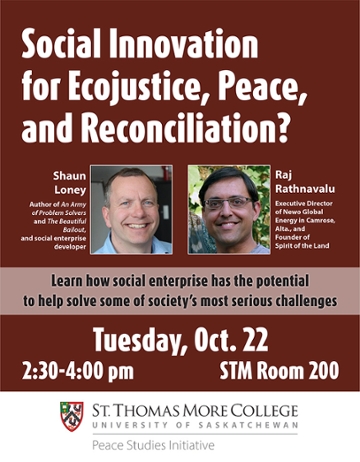
Social Innovation for Ecojustice, Peace, and Reconciliation?
Shaun Loney, author of An Army of Problem Solvers and The Beautiful Bailout, social enterprise developer; and Raj Rathnavalu, Executive Director of Newo Global Energy (social enterprise in Camrose Alberta), founder, Spirit of the Land
October 22, 2019, 2:30pm
STM Room 200
Presented by St. Thomas More College Peace Studies Initiative
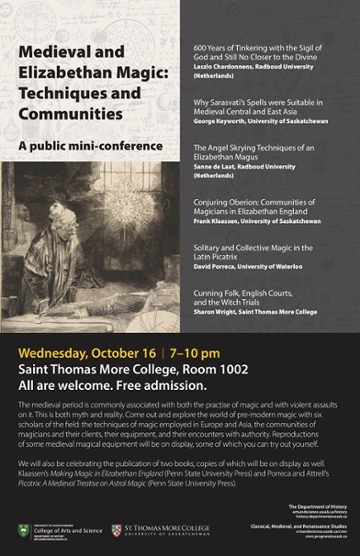
Medieval and Elizabethan Magic: Techniques and Communities
A Public Mini-Conference
Wednesday, October 16, 7:00-10:00pm
Room 1002
Presented by St. Thomas More College and the U of S College of Arts & Science
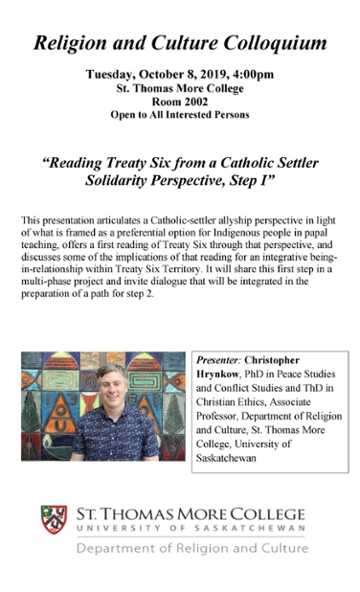
Reading Treaty Six from a Catholic Settler Solidarity Perspective, Step I
Chris Hrynkow, STM Department of Religion and Culture
Religion and Culture Colloquium
October 8, 2019, 4:00pm
STM 2002
Presented by St. Thomas More College Department of Religion and Culture
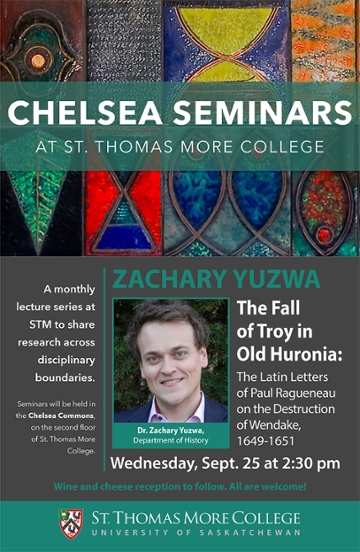
The Fall of Troy in Old Huronia: The Latin Letters of Paul Ragueneau on the Destruction of Wendake, 1649-1651
Chelsea Seminar Series
Zachary Yuzwa, STM Department of History
September 25, 2019, 2:30pm
Presented by St. Thomas More College
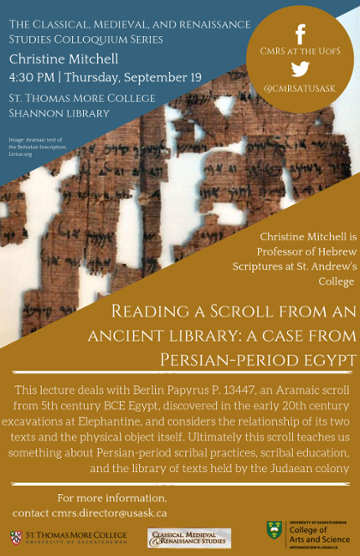
Reading a Scroll from an Ancient Library: A Case from Persian-Period Egypt
Classical, Medieval, and Renaissance Studies Colloquium
Christine Mitchell, St. Andrew's College
September 19, 2019, 4:30pm
Presented by St. Thomas More College and the U of S College of Arts and Science
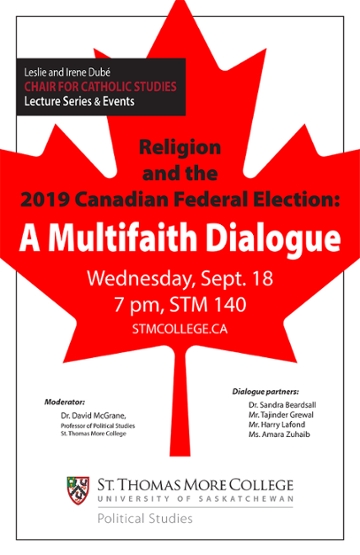
Religion and the 2019 Canadian Federal Election: A Multifaith Dialogue
Featuring David McGrane (moderator), Sandra Beardsall, Tajinder Grewal, Harry Lafond, and Amara Zuhaib
September 18, 2019, 7pm
Presented by the Les & Irene Dubé Chair for Catholic Studies Lecture Series; STM Political Studies Department
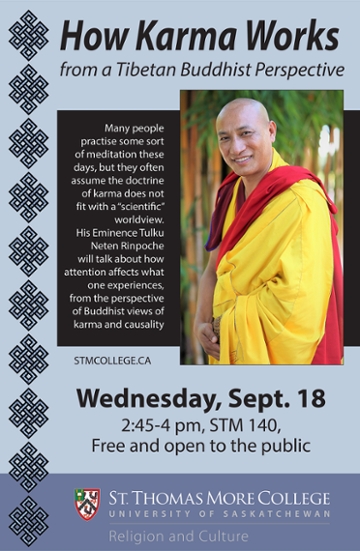
How Karma Works: from a Tibetan Buddhist Perspective
His Eminence Tulku Neten Rinpoche
September 18, 2019, 2:45pm
Presented by the STM Religion and Culture department
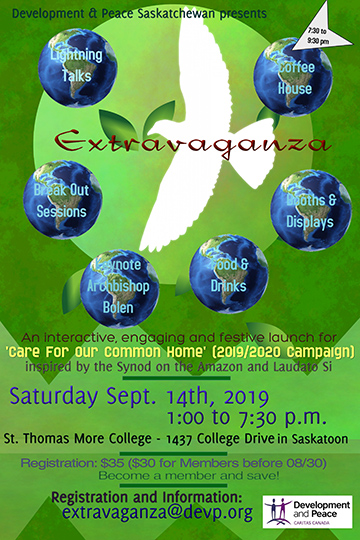
Extravaganza
Presented by Development & Peace Saskatchewan
Saturday, Sept. 14, 2019
1:00-9:30 pm
St. Thomas More College
The Development & Peace region of Saskatchewan – Keewatin Le Pas is inviting its members and the public to its Campaign Extravaganza on Saturday Sept. 14, 2019 at St. Thomas More College, U of S (1437 College Drive, Saskatoon). Beginning at 1:00 and running to 9:30 pm, our Extravaganza is an interactive, engaging and festive launch of our 2019-2020 campaign, “Care for Our Common Home”.
This event will be a first look at our campaign that is inspired by the upcoming Synod on the Amazon and Pope Francis’ encyclical Laudato Si. Our keynote speaker is Archbishop Don Bolen, who participated in pre-synod meetings with the Pan-Amazonian Ecclesial Network.
Registration: $35 ($30 for members). Deadline: Aug. 30. On-line registration includes a small processing fee. https://www.eventbrite.ca/e/extravaganza-campaign-launch-2019-tickets-62416377064 . Coffeehouse only: $5 at the door. For more information contact extravaganza@devp.org .
The day’s program which you may join at any time:
12:30 – Registration/arrival begins
1:00 – Welcome, Opening Prayer (MC)
1:40 – Lightning Talks (3 presenters) – 5 minute talks by the presenters to introduce & lightly summarize their topic
2:00 – Breakout Sessions (3 sessions) – participants choose which presentations to attend
3:10 – BREAK
3:30 – Keynote from Bishop Don
4:30 -5:15 – Wrap Up & Action Commitment
5:30 – Evening Prayer/Liturgy
6:00 – Supper
7:30 -9:30 – Coffeehouse
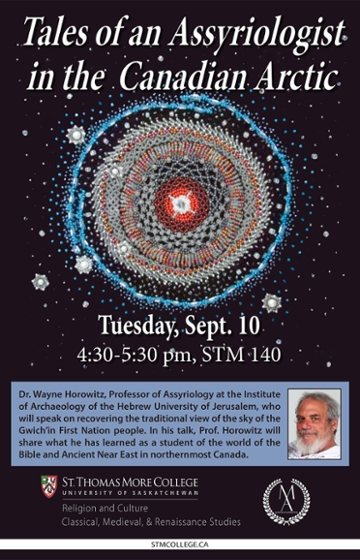
Tales of an Assyriologist in the Canadian Arctic
Dr. Wayne Horowitz, Hebrew University of Jerusalem
September 10, 2019, 4:30pm
Presented by the STM Religion and Culture Department; Classical, Medieval, and Renaissance Studies; the Museum of Antiquities
Saskatchewan Center for Science and Religion 2nd International Conference
Our Place in the Cosmos?: Humanity, Spirituality, and the Awesome Universe
Aug. 13-14, 2018
This conference is to inspire conversation around the roles and responsibilities of humanity within the dynamic, fascinating, and sometimes awe-inspiring cosmos which comes into view via modern science.
Topics: the work of historical scientists like Copernicus and Darwin who served to remove our home planet and humanity from their special place in the cosmos; the shifting of our religious and spiritual expressions to tolerate, accommodate, and even promote new cosmologies; as well as more contemporary developments in scientific theory such as: big bang cosmology, quantum theory, ‘Mitochondrial Eve’, the multiverse, the Gaia hypothesis, the anthropic principle, and many more!
Featuring: Br. Guy Consolmagno S.J., Ph.D., Jeff Baker Ph.D. and Elder Wilfred Buck B.Ed., PBCE, Loriliai Biernacki Ph.D.
Conference Full program details
Academic Lectures 2018-2019
Determination, Devotion and Diplomacy: Women Building Peace in Ukraine
Peace Studies Lecture
Featuring Dr. Maureen Flaherty, Assoc. Prof. of Peace and Conflict Studies, University of Manitoba
Oct. 4, 2018
Presented by STM Peace Studies Initiative and Prairie Centre for the Study of Ukrainian Heritage
The Open Circle: Catholic Universities Building Bridges
2018 Michael Keenan Memorial Lecture
Featuring Fr. James Heft
Oct. 25, 2018
A renowned thinker in the field of Catholic higher education visited St. Thomas More College to deliver the 30th edition of the Michael Keenan Memorial Lecture. In his presentation, Fr. Heft took a look at the future of Catholic colleges and the mission of a Catholic college in federation with a larger university.
Presented by St. Thomas More College
The Natural Epistimology of Aquinas. Sources, Traditional Interpretation and Recent Challenges
Featuring Dr. Richard C. Taylor, Professor of Philosophy, Klingler College, Marquette University
March 11, 2019
Presented by the STM Philosophy Department
The Legitimacy and Power of Gender Fluidity in Medieval Thought
Annual John Thompson Lecture
Featuring Dr. Sharon Wright, Department Head, History, Classical, Medieval and Renaissance Studies
March 12, 2019
Presented by the St. Thomas More College Students' Union (STMSU)
"Ecumenism in a Secular Age. A Theological Conviction and a Practical Necessity"
De Margerie Ecumenical Lecture
Featuring Rev. Dr. Gordon T. Smith, President Ambrose University and Seminary
March 14, 2019
Dr. Smith takes a look at what it means to be the church in a post-Christian, pluralist and secular context. How can the church be dynamic and responsive in the world today?
Presented by STM, Les and Irene Dubé Chair in Catholic Studies, Roman Catholic Diocese of Saskatoon, Prairie Centre for Ecumenism
2019 Mohyla Lecture
The 2019 Mohyla Lecture was scheduled for March 28, 2019, but was cancelled due to an unavoidable cancellation by the guest speaker. The lecture will return in spring 2020.
Presented by The Prairie Centre for the Study of Ukrainian Heritage
They are not revolutionists, but... The Meaning and Legacy of the Winnipeg General Strike
Second Annual Byers-Makahonuk Lecture
Featuring Dr. James Naylor, Brandon University, long-time member of the editorial board of Labour/Le Travail
March 28, 2019
Presented by St. Thomas More College, CUPE Saskatchewan, and the Saskatchewan Federation of Labour
Leslie and Irene Dubé Chair for Catholic Studies Lecture Series and Events
Gaudete et Exsultate (Rejoice and be Glad) Perspectives on Pope Francis’ Apostolic Exhortation on the Call to Holiness
Leslie and Irene Dubé Chair for Catholic Studies Lecture Series and Events
Featuring Bishop Mark Hagemoen, Dr. David McGrane, Dr. Gertrude Rompré, and Dr. Cynthia Wallace
Tuesday, Sept. 18
A discussion of how Gaudate et Exsultate speaks to everyday political and social problems. The panel presentation was followed by audience questions and a reception.
Presented by St. Thomas More College
Tracking Religious Trends in Canada: A Conversation with Angus Reid
Leslie and Irene Dubé Chair for Catholic Studies Lecture Series & Events
Featuring Dr. Angus Reid
Oct. 19, 2018
Presented by St. Thomas More College
Archaeology, Archives, and Semiotics. Interpreting figurines from ancient Jerusalem
Leslie and Irene Dubé Chair for Catholic Studies Lecture Series and Events
Featuring Rev. Dr. Josef Mario Briffa, Director of the PBI Museum Pontifical Biblical Institute
Nov. 26, 2018
Presented by St. Thomas More College
Religion and Culture Colloquium Series 2018/2019
Rethinking ‘Getting in the Way’: Christian Peacemaker Teams’ International Accompaniment
and Solidarity Work Read Through a Peace and Conflict Studies Lens
Religion and Culture Colloquium Session
Featuring Dr. Christopher Hrynkow, Associate Professor, Dept. of Religion and Culture
Sept. 18, 2018
Presented by STM Religion and Culture Department and the U of S College of Arts and Science
Her Jeweled Island Abode: teleological visions of Manidvipa and the New Jerusalem
Religion and Culture Colloquium Session
Featuring Meera Kachroo, Sessional Instructor, Dept. of Religion and Culture, PhD Candidate
Nov. 20, 2018
Presented by STM Religion and Culture Department and the U of S College of Arts and Science
Refugee Reversals: A Postcolonial History of the Impact of the Canadian Mission to Manchurian Koreans on the United Church of Canada
Religion and Culture Colloquium Series
Featuring Rev. David Kim Cragg, Grosvenor Park United Church, PhD candidate
Feb. 28, 2019
Presented by STM Religion and Culture Department and the U of S College of Arts and Science
Are Muslims and their religiosity a threat to secular Canada?
Religion and Culture Colloquium Series
Featuring Dr. Fachrizal Halim, Lecturer, Dept. of Religion and Culture
March. 28, 2019
Presented by STM Religion and Culture Department and the U of S College of Arts and Science
Chelsea Seminar Series 2018/2019
Changing Landscape of Elder Care in Canada: Clinical Research to Address Growing Needs
Paulette Hunter, STM Department of Psychology
September 19, 2018
Dr. Hunter (Ph.D., R.D. Psych.) from the Department of Psychology will give this first lecture in a new series of research seminars at STM. She will address the issues we face in the changing context of long-term care in Canada and examine innovative approaches to addressing the need for palliative care in this setting.
Presented by St. Thomas More College
The Rise of Princelings in China: Career Advantages and Collective Elite Reproduction
Tony Zhang, STM Department of Sociology
October 31, 2018
Dr. Zhang from the Department of Sociology will discuss the phenomenon of princelings in modern China, considering the ways in which these elites have benefited from their family backgrounds. He will examine the factors that combine to favour these princelings through a process he terms “collective elite reproduction”.
Presented by St. Thomas More College
Amphibious Beings: Balzac’s Representation of the Female Writer in 19th c. France
Tania Duclos, STM Department of Languages, Literatures, and Cultural Studies
November 21, 2018
Dr. Duclos, from the
Department of Languages,
Literatures and Cultural
Studies, will discuss Balzac’s
depiction of female writers, by exploring their liminal qualities as “amphibious beings” that move between disparately gendered spaces.
Presented by St. Thomas More College
Placing Women’s Economics within the Soviet Economic Discourse: 1917-1991
Anna Klimina, STM Department of Economics
January 30, 2019
Dr. Anna Klimina, from STM's Department of Economics, offers a history of women's economic thought in post-1917 Russia, examining the different socio-political forces that condition the intellectual contributions of women economists under Soviet authoritarianism.
Presented by St. Thomas More College
The End of Militancy? Examining the Falling Strike Numbers Amongst the Canadian Working Class
Charles Smith, STM Department of Political Studies
February 27, 2019
Why do workers strike less often than they used to? Labour militancy is at its lowest level in Canada since World War II. In this seminar, Dr. Charles Smith, from STM’s Department of Political Studies, examines the decline in the frequency of strikes and considers the factors that led to the current situation.
Presented by St. Thomas More College
Self and Selfishness in Ancient Philosophy: Plotinus and the Stoics
Daniel Regnier, STM Department of Philosophy
March 27, 2019
Theories about how we create our identities go back to ancient philosophy. Dr. Daniel Regnier, from STM's department of Philosophy, will discuss the roots of modern notions of self, cosmopolitanism, and "othering" in his examination of a debate between two major movements in ancient philosophy concerning the nature of the self.
Presented by St. Thomas More College
Classical, Medieval and Renaissance Studies Colloquium Series 2018/2019
Scattered Leaves and Virtual Manuscripts: The Promise of Digital Fragmentology
Classical, Medieval, and Renaissance Studies Colloquium
Featuring Lisa Fagin Davis, Executive Director of the Medieval Academy of America and the author of the Manuscript Road Trip blog.
Sept. 27, 2018
In the first half of the twentieth century, book dealers in the United States discovered that they could significantly increase profits if they cut up early books and manuscripts and sold them page by page. As a result, thousands of precious medieval manuscripts were dismembered and their leaves scattered in a seemingly irreparable scourge of biblioclasm.
Presented by St. Thomas More College and the U of S College of Arts and Science
From Collation to Edition: One Small Step, one Giant Leap
Classical, Medieval, and Renaissance Studies Colloquium
Featuring Dominik Wujastyk, Singhmar Chair in Classical Indian Society and Polity at the University of Alberta.
Oct. 18, 2018
In recent decades there has been a new birth of interest amongst scholars of India in the creation of text editions based on Sanskrit manuscripts.
Presented by St. Thomas More College and the U of S College of Arts and Science
Living in the Ancient Roman City: Space, Religion, Dangers
Classical, Medieval, and Renaissance Studies Colloquium
Students of History 308.6 Rome Study Abroad 2018 screen their short video projects, and reflect on their experiences of ancient Rome, on the ground.
Nov 22, 2018
Presented by St. Thomas More College and the U of S College of Arts and Science
Constructing Identity: Women, Public Building, and Ummidia Quadratilla’s Entertainment Complex at Roman Casinum
Classical, Medieval, and Renaissance Studies Colloquium
Featuring Karin S. Tate, CMRS Fellow
Jan. 17, 2019
Taking the wealthy matron Ummidia Quadratilla as a case study, we will explore the implications of women’s public building projects during the Roman imperial period.
Presented by St. Thomas More College and the U of S College of Arts and Science
Translation and Authority in Early Modern Emblem Books: Esther Inglis’s Emblemes Chrestiens
Part of the Classical, Medieval and Renaissance Studies (CMRS) Colloquium Series
Featuring Dr. Kristen Inglis, University of Alberta
March 21, 2019
This talk argues for Esther Inglis’s 1624 hand-drawn copy of Georgette de Montenay’s Emblemes ou Devises Chrestiennes as a work of translation that intervenes in the turbulent politics of late Jacobean England.
Presented by St. Thomas More College and the U of S College of Arts and Science
Academic Events 2017-2018
PCUH Ukrainian Language Assessment Symposium
PCUH Ukrainian Language Assessment Symposium Oct. 13-14, 2017
Catholicism and Communication: The Sensus Communis, Synesthesia, and the Soul
29th Annual Michael Keenan Memorial Lecture
Featuring Dr. Eric McLuhan
November 2, 2017
For many centuries, it has been a commonplace that “there is nothing in the mind that is not first in the senses.” Human experience involves several groups of senses—the five or more bodily senses,the four intellectual senses (of Scripture and equally of poetry and prose), and the three spiritual senses (the theological virtues). Each group forms an organic unit—a sensus communis—in which the members co-operate. The several groups, too, communicate with each other synesthetically. Marshall McLuhan used this understanding to found his own approach to the study of communication media. It differs radically from the universal “transportation” model, and it is uniquely capable of making sense of how of electric technologies from the telegraph to the Internet and cyberspace transform us and our world.
Presented by St. Thomas More College
A Study and Critical Analysis of Aquinas's Arguments for the Existence of God
Featuring Professor Jack MacIntosh (University of Calgary)
January 19, 2018
Presented by the STM Philosophy Department
Surprised by Unity - finding openess in ways we hadn't planned
De Margerie Ecumenical Lecture
Featuring Rev. Dr. Susan Durber
January 25, 2018
Surprised by Unity, finding oneness in ways we hadn't planned
One Hundred Years of Ukrainian Modern Statehood
2018 Mohyla Lecture
Featuring Prof. Serhy Yekelchyk, University of Victoria
February 15, 2018
A century ago the Ukrainian People's Republic (UNR) declared independence thus breaking ties with Russia while establishing a modern democratic Ukrainian state. Was this viewed as a continuation of the longer Ukrainian historical tradition of statehood? In what way did the proclamation and defeat of the UNR influence twentieth-century struggles for a free and independent Ukraine, which emerged in 1991? Is the current conflict with Russia a replay of the "hybrid war" the Bolsheviks conducted against the UNR in 1918? What are the lessons to be learned?
Presented by The Prairie Centre for the Study of Ukrainian Heritage
Preparing Future Leaders In the Age of Technology: Leadership Formation on the Frontiers of Quantum Computing: A Conversation with Dr. Terry Downey on the Role of Catholic Higher Education
Annual John Thompson Lecture
STM President Dr. Terrence Downey in conversation with students.
February 27, 2018
Presented buy the St. Thomas More College Students' Union (STMSU)
A Victory for One is a Victory for All: Labour and Socialist Women Campaign for the Right to Vote
First Annual Byers-Makahonuk Lecture
Featuring Dr. Joan I. Sangster, FRSC Vanier Professor, Trent University
Director, Frost Centre for Canadian Studies and Indigenous Studies
March 7, 2018
Catholic Studies and Critical Perspectives on Social Justice and the Common Good Conference
Integral Ecology for the Common Good: Catholic Perspectives on Science, Sustainability, and Justice
March 22-23, 2018
Featuring Sr. Ilia Delio, OSF, Villanova University
Religion, Science, and World-Making: From Whole Earth to Astrobiology
Featuring Lisa H. Sideris (Department of Religious Studies, Indiana University)
March 26, 2018
Presented by St. Thomas More College and the Saskatchewan Center for Science and Religion
Leslie and Irene Dubé Chair for Catholic Studies Lecture Series and Events
Integral Ecology and the Search for Wholeness: Are We Looking at the Wrong Universe?
Leslie and Irene Dubé Chair for Catholic Studies Lecture Series and Events
Featuring Sr. Ilia Delio, OSF, Villanova University
March 22, 201
Religion and Culture Colloquium Series 2017-18
Nothing but a False Sense of Security: Mapping and Critically Assessing Papal Support for a World Free from Nuclear Weapons
Religion and Culture Colloquium Series
Presented by Dr. Chris Hrynkow
January 11, 2018
Presented by the STM Religion and Culture Department
Mission and Migration: Korean/Canadians in The United Church of Canada
Religion and Culture Colloquium Series
January 25, 2018
There are a growing number of Korean/Canadian congregations in The United Church and a growing number of Korean/Canadian clergy serving largely Caucasian congregations in the same. This presentation will situate this growth within the current phenomenon of international migration. It will examine typical aspects of Korean/Canadian experiences of migration, theological resources that speak to this, and the mission for Korean/Canadians in the United Church that arises out of it.
Jointly presented by Donald Schweitzer (PhD; McDougald Professor of Theology at St. Andrews College) and HyeRan Kim-Cragg (ThD; Lydia Gruchy Professor of Pastoral Studies at St. Andrews College)
Presented by the STM Religion and Culture Department
Swords into Ploughshares: Building Partnership and Peace Education between Jewish and Palestinian Arab Citizens of Israel
Religion and Culture Colloquium Series
March 1, 2018
Come meet and hear Lee Gordon, founder of Hand in Hand: Center for Jewish-Arab Education in Israel, which has established a growing network of integrated bilingual schools in Israel that bring together thousands of Jewish and Arab children, youth, families and the wider community. In the context of the ongoing conflict between Arabs and Jews, Israelis and Palestinians, Hand in Hand has created a viable new model of integrated education and “shared society” and its impact is growing. For more information on Hand in Hand - Please view this link
Presented by the STM Religion and Culture Department
Written in Stone: Archaeological Evidence of Biblical Events from the Holy Land?
Religion and Culture Colloquium Series V
March 8, 2018
From the biblical story of Noah and the Flood to the destruction of the Kingdoms of Israel by the Assyrians, archaeologists and the general public have been fascinated by the history of ancient Israel. The discipline of ‘Biblical Archaeology’ since the 1980’s has been fraught with those trying to ‘prove’ actual events of the bible through archaeological evidence versus those who simply investigate the ancient cultures described in biblical sources. This talk will investigate the different perspectives with regards to artifacts uncovered from archaeological sites in the Holy Land and ancient Mesopotamia.
Featuring Tina Greenfield, PhD in Near Eastern Archaeology, University of Cambridge, UK. Lecturer (Archaeology) in the Department of Religion and Culture at St. Thomas More College, University of Saskatchewan.
Presented by STM Religion and Culture Department and the U of S College of Arts and Sciences
Configuring Catholicism in contemporary Timor Leste
Religion and Culture Colloquium Series
Featuring Susana Barnes, PhD Anthropology, Adjunct Professor in the Department of Archaeology and Anthropology, University of Saskatchewan, Research Associate in the School of Geography, University of Melbourne, Australia
March 15, 2018
After the Phillipines, Timor Leste (East Timor) has the highest population of Roman Catholics in Southeast Asia. Today around 90% of East Timorese identify as Roman Catholic, however, despite over 500 years of missionising activity this level of identification with Roman Catholicism is relatively recent and is tied to histories of Portuguese colonisation and Indonesian military occupation (Durand 2004). Since the restoration of independence, the revival of customary beliefs and practices and an intensification of missionary activity on behalf of Protestant evangelical churches has generated a degree of anxiety among agents of the Catholic Church concerning the sincerity of religious practice (see Silva 2017). This anxiety often manifests itself in a desire for purification and monopolisation of faith particularly in relation to beliefs and practices embedded in local ‘spiritual ecologies’ (Palmer 2015, see also Silva 2017, Barnes 2017). In this talk I draw on ethnographic research to explore the relationship between Catholicism and customary beliefs and practices in Timor Leste by focusing on the tension between continuity and rupture, and the co-existence moral traditions and social spaces.
Presented by STM Religion and Culture Department and the U of S College of Arts and Science
Imagining Identity: Enshrining the Hermeneutics of Dialogue and Reflexivity within the Practices of Catholic Higher Education
Religion and Culture Colloquium Series
Featuring Gertrude Rompre, doctoral student in the Centre for Higher Education Studies at the University of Liverpool. She also serves as the Director of Mission and Ministry at St. Thomas More College, University of Saskatchewan
This presentation explores how people experience the religious identity of their workplaces, in this case Catholic higher education institutions in Canada. Using a critical realist lens, and applying critical grounded theory within the domain of higher education, it seeks to understand how the experience of an explicitly religious institutional identity shapes individual capacity to exercise agency in its regard. In doing so, the presenter proposes a way of conceptualizing Catholic institutional identity that is dialogical and capable of both respecting the Catholic intellectual tradition and responding to current needs, characterizing this negotiated identity as a ‘balancing-act’. This presentation also maps the evolution of ‘identity-carriers’ within these institutions. Finally, the presenter argues for the creation of reflexive spaces, which allow individuals to discern how their own personal life-projects/identities relate to the Catholic institutional identity of their workplaces. While focusing on the context of Canadian Catholic higher education, this presentation will also contribute to the wider discourse on Catholic identity, institutional identity, and, critical realist social theory.Presented by STM Religion and Culture Department
Classical, Medieval and Renaissance Studies Colloquium Series 2017-2018
Dining with the Assyrians: cuisine, consumption, and sacrifice at Ziyaret Tepe
Classical, Medieval and Renaissance Studies (CMRS) Colloquium Series
Presented by Dr. Tina Greenfield
January 18, 2018
Presented by STM Religion and Culture Department and the U of S College of Arts and Science
Yes Preaching to the Birds! Clare and Francis of Assisi as Wellsprings of Socio-Ecological Wisdom
Classical, Medieval and Renaissance Studies (CMRS) Colloquium Series
Featuring Dr. Christopher Hrynkow
February 15, 2018
Presented by St. Thomas More College and the U of S College of Arts and Science
Textual Communities: or, Everyone an Editor
Classical, Medieval and Renaissance Studies (CMRS) Colloquium Series
Featuring Peter Robinson, Department of English (College of Arts and Science)
March 15, 2018
This talk will introduce the new Textual Communities system for online collaborative editing, and illustrate its use with examples from the Canterbury Tales Project. Textual Communities is now in pre-release 'sandbox' mode, and you are invited to try out the new system. The talk will discuss what earlier stages of the Canterbury Tales Project were able to discover using earlier systems, and how this new system might enable this project (and others) to achieve more.
Presented by STM Religion and Culture Department and the U of S College of Arts and Science
Academic Events 2016-2017
Utopia Conference
Sept. 22-23, 2016
Celebrating the 500th Anniversary of Thomas More's Utopia
Family Common Home Conference
Oct. 22, 2016
Our Common Home: As Long as the Rivers Flow(Held at Holy Cathedral in Saskatoon)
The Song of Death, the Lyrics of Euthanasia versus The Song of Life, the Lyrics of Love and Hope
2016 Michael Keenan Memorial Lecture
Nov. 24, 2016
Featuring Dr. Margaret Anne Ganley Somerville
The Meaning of Reconciliation
Special Lecture
Nov. 30, 2016
The Meaning of Reconciliation
Featuring Phil Fontaine, OC, OM
Presented by St. Thomas More College
De Margerie Ecumenical Lecture Series
Jan. 26, 2017
Reformation Today: From Conflict to Communion, Together in Hope
Dr. Dirk Lange
Presented by STM, Les and Irene Dubé Chair in Catholic Studies, Roman Catholic Diocese of Saskatoon, Prairie Centre for Ecumenism
Ecumenism on the Peacelines: Building Communities of Reconcilliation in the Midst of Northern Irish Troubles
Special Social Justice Lecture
Feb. 9, 2017
Evolution of Ukraine's Media Since Independence
2017 Mohyla Lecture
Feb. 17, 2017
Presented by The Prairie Centre for the Study of Ukrainian Heritage
Academic Events 2015-2016
Restorative Justice Conference
Oct. 1-3, 2015
Restorative Justice: Building a Culture of Hope
Featuring Bishop Gary Gordon
Beyond Restorative Justice… is the Horizon of Mercy
Featuring Bishop Gary Gordon
See the news article HERE
Presented by St. Thomas More College
A Complicated Story: Christianity in Indigenous Histories
Symposium
March 2, 2016
Co-sponsored by USask Department of History
Beyond Silos Prairie Views on Caring for our Common Home
Laudato Si' Conference
March 11-12, 2016
Presented by St. Thomas More College
On Building an Ecumenical Barn
De Margerie Ecumenical Lecture Series
Jan. 21, 2016
Featuring Bishop Kenneth Kearan
Presented by STM, Les and Irene Dube Chair in Catholic Studies, Roman Catholic Diocese of Saskatoon, Prairie Centre for Ecumenism
Ukrainian Nationalism, 1929-1956: Academic Judgements and Popular Perceptions
Mohyla Lecture Series
Feb. 11, 2016
Ukrainian Nationalism, 1929-1956: Academic Judgements and Popular Perceptions
Featuring Dr. Myroslav Shkandrij
Presented by St. Thomas More College
Jean Vanier and Henri Nouwen: The Great Friendship
Michael Higgins Lecture
March 10, 2016
Featuring Michael Higgins
Presented by St. Thomas More College
The Basilians, STM and the U of S: A Unique Experience in Canadian Education
Basilian History Lecture
April 14, 2016
The Basilians, STM and the U of S: A Unique Experience in Canadian Education
Featuring Dr. Michael Hayden and Rev. Dr. Ron Griffin, CSB
----------------------------
Turning to the World: Social Justice and
The Common Good Since Vatican II
St. Thomas More College
Saskatoon, Saskatchewan
March 8-9, 2013
St. Thomas More College was pleased to host a conference on social justice and the common good on March of 2013 to mark the 50th anniversary of Vatican II. The conference drew an interdisciplinary audience of scholars in areas such as sociology, history, philosophy, religious studies, economics, and political studies whose research has focused on documenting and comprehending changes in the field of social justice that stemmed from this momentous historical event.
Friday, March 8, 2013
Dr. Terrence Downey, President, St. Thomas More College - Greetings
Bishop Don Bolen, Roman Catholic Diocese of Saskatoon – Opening Prayer
Opening Session - Chair: Dr. Carl Still, Dean, St. Thomas More College
Bishop Remi De Roo, Bishop Emeritus of the Diocese of Victoria
Living the Vision of Vatican II
Dr. Catherine Clifford, Professor, Faculty of Theology, Saint Paul University
Social Justice and the Common Good in the Teaching of Vatican II
Abstract: This paper will explore the notion of the common good as it has emerged in Catholic teaching in the early twentieth century and received in the teaching of the Second Vatican Council, with particular attention to its development in the Pastoral Constitution of the Church in the Modern World (Gaudium et Spes) which relates it to the “general welfare of the entire human family” (GS 26). Finally, it will ask what dimensions of the common good might merit consideration in the present context.
Dr. Michael Duggan, Professor of Theology and Religious Studies, St. Mary’s University College
Personalism, Conscience and Freedom: New Foundations for Catholic Social Teaching at Vatican II
Abstract: The understanding of the human person, with attention to conscience and freedom, provided the platform for the principles of Catholic Social Teaching at Vatican II, animated social reflection throughout the reign of Paul VI, and remained foundational to discussions of social justice over the past 50 years. This paper consists of three parts: (1) an examination of the human person, conscience and freedom in relation to social justice principles in the conciliar documents Gaudium et Spes and Dignitatis Humanae; (2) a description of how the new humanism of Vatican II propelled calls to action during the papacy of Paul VI in his encyclicals Populorum Progressio (1967) and Evangelii Nuntiandi (1975) which were bookends for the statements of the Medellin conference of the Bishops of Latin America (September 6, 1968), and documents Justice in the World of the third synod of Bishops (1971), and (3) a summarizing conclusion that highlights the urgency of refocusing attention on liberation, which had been central to Catholic Social Teaching in the first decade after the Council but has received diminishing emphasis from 1980 to the present.
Saturday, March 9, 2013
Co-keynote Address - Moderator: Dr. Terrence Downey, President, St. Thomas More College
Dr. Gregory Baum, Professor Emeritus, McGill University (via Skype)
Faith and the Commitment to Social Justice
Abstract: In the historical context of the 1960s and 1970s official Catholic social teaching called for radical social change and looked upon the struggle for justice as a public witness to Jesus Christ. A typical example is the statement 'Justice in the World' published by the World Synod of Bishops of 1971. In the present lecture I wish to show that in the historical situation beginning in the late 1980s, official Catholic teaching became more conformist and made a clear distinction between the Church's evangelizing mission and its commitment to promote justice and peace. A typical example are the new regulations imposed by the Canadian bishops on the Catholic N.G.O. Development and Peace.
Dr. Stephen Scharper, Associate Professor, Department of Anthropology, and Centre for Environment, University of Toronto
Vatican II and Social Justice: From the Common Good to the Commons
Abstract: Since the conclusion of the Second Vatican Council, religious conversations concerning social justice have increasingly included environmental concerns. Rather than simply a “Velcro-like” addition to the ecclesial social justice agenda, ecological concerns are foundational to Christian responses to the common good. Re-envisioning the role of the human is thus a critical enterprise. In this presentation, the notion of “the commons” as it relates to creation, commodified nature, and the link between an “option for the poor” and “option for the earth” will be explored. This new ecological moment, it will be suggested, challenges church teaching to move from anthropocentrism, where even as stewards of creation we see ourselves in a managerial role, to the notion of anthropoharmonism, where we see the human role as focal but nonetheless oriented toward respectful and loving integration within the biotic community.
Session I – Preferential Option for the Poor, Chair: Dr. Anna Klimina, Associate Professor, Department of Economics,St. Thomas More College
Fr. Eduardo Soto Parra, PhD Candidate, Peace and Conflict Studies, University of Manitoba
The Role of Vatican II in the Roman Catholic Church Orientation Towards Social Justice in Latin America
Abstract: The change that happened in the 1970s and 1980s in the Roman Catholic Church in Latin America regarding social justice and attention to the poor is evident, not only in the ways that the resultant documents from the Latin American Bishop Conference have addressed the topic, but also in the method and locations chosen by church leaders to pursue their task of evangelization. However, this change is due not only to the influence of Vatican II but also to certain political situations and philosophical orientations that also were relevant in Latin America at that time. By analysing of the final documents released by each Latin American Bishop Conference since Vatican II, this paper defines the role of the Vatican II documents in the shift referred above, and how the Vatican II orientation enlightened understandings and interpretations of those events and situations in the region that modeled the Latin American Church.
Ms. Anna Blackman, PhD Candidate, Catholic Social Teaching and Civil Society, Durham University
Moralising Neo-Liberalism? An analysis of the principle of subsidiarity in Catholic Social Teaching
Abstract: This paper will explore the evolution of the principle of subsidiarity in Catholic Social Teaching in relation to interpretations of what constitutes necessary and appropriate State intervention. In particular, attention will be paid to the developments following Vatican II, highlighting the relationship between Catholic Social Teaching and Neo-liberalism. Using the recent critique by the Radical Orthodoxy Movement of the account of subsidiarity found in Church teaching, this paper will question whether Catholic Social Teaching has failed to be sufficiently critical of Neo-liberalism and the expansion of the Market, perhaps even going so far as to implicitly endorse them. Can the theology of Radical Orthodoxy act as a corrective to this, providing a moreadequate reading to provide for social justice, based on an ecclesiological theology that radically rejects the entire Neo-liberal system, rather than one based in natural law which it criticises for simply 'moralising' the system's worst excesses? This paper will conclude by considering the contribution of Rowan Williams, suggesting this may provide a useful middle ground between both theologies.
Session II – Religious Pluralism/Culture of Peace, Chair: Dr. Darrell McLaughlin, Associate Dean, St. Thomas More College
Dr. Alisha Pomazon, Assistant Professor, Department of Religion and Culture, St. Thomas More College
Linking Nostra Aetate to Social Justice Teaching
Abstract: What is human dignity? How is it understood in terms of interreligious dialogue and social justice teachings? In this paper, I will analyze the connection between dialogue and dignity by looking at these as ideas as promulgated by Nostra Aetate and Catholic social justice teaching. In doing so, I intend to analyze foundational ideas of covenant, covenantal relationship and Jewish social justice in order to argue that Nostra Aetate, the Vatican’s understanding of its relation to the world, and the Vatican’s understanding of its relation to the world’s people represent moments of social justice, which grounds the idea of human dignity in the world. Thus, this paper will draw on the Vatican’s documents concerning its relation to Judaism and the modern world, as well as upon Jewish responses (including David Meyer, Jonathan Sacks and David Rosen) to Vatican documents, Catholic social justice teaching, and the ideas of interreligious dialogue.
Dr. Darren Dahl, Sessional Lecturer, Department of Religion and Culture, St. Thomas More College and Director of Prairie Centre for Ecumenism
Piercing the Banality of the Present: Ecumenism, Politics, and Reformation
Abstract: This paper discusses the Second Vatican Council’s Decree on Ecumenism (Unitatis Redintegratio) in light of the Pastoral Constitution on the Church in the Modern World (Gaudium et Spes) in order to explore the connections between ecumenism and political theology in the thought of Johann Baptist Metz. Drawing particularly on Metz’s 1970 Concilium essay dedicated to the question of ecumenism, the paper argues that the Decree on Ecumenism can be fruitfully read in conversation with Gaudium et Spes. In constructing the conversation in this manner, the paper seeks draw ecumenical theology into a properly political engagement.
Mr. Chris Hrynkow, Assistant Professor, Department of Religion and Culture, St. Thomas More College
A Green Vision of Peace? Catholic Social Teaching and Its Contribution to the Culture of Peace Since Vatican II
Abstract: This paper builds on the premise that exercises of the magisterial office, addressing both “the faithful” (who now number over one billion) and (often) “people of good will” on matters of peace and justice have a role in crafting a culture of substantive peace. In this paper, I propose to critically examine this contribution from a green perspective that seeks to keep social justice, ecological health and the cosmic common good symbiotically joined. In short, this paper will comment on how, when viewed through an theo-ecological ethical lens, select content of post-Vatican II Catholic Social Teaching is significant for the way its moral standpoint rhetorically contributes to or detracts from human flourishing within an atmosphere of substantively peaceful and mutually enhancing human-Earth relationships (i .e. a green perspective on the culture of peace). By way of a conclusion, suggestions for possible green improvements to Catholic Social Teaching so that it can better contribute to a substantive culture of peace will be offered.
Session III – Living Social Justice and the Common Good, Chair: Dr. Saeed Moshiri, Assistant Professor, Department of Economics, St. Thomas More College
Dr. Loren Stuckenbruck, Professor of New Testament and Second Temple Judaism, Ludwig-Maximilians-Universität
Visions of Social Justice and Human Integrity in Early Jewish Apocalyptic Thought: Implications for Christian Theology
Abstract: Vatican II and its aftermath, beginning with Nostra Aetate (1965), opened up pathways among biblical scholars to explore social justice issues while drawing theologically on Jewish tradition, whether the Old Testament or other ancient writings. Critiques of oppressive wealth, heard in the Hebrew Bible, reached a climax within “apocalyptic” tradition that proclaimed a vision for a different world, in order to comfort the faithful for whom it is a hostile place. Although focus on another world could undermine work towards social justice within the present, it originated from a Jewish protest tradition that anticipated a transformation more than the dissolution of present structures and institutions. In the spirit of Nostra Aetate, this paper explores social justice in relation to human dignity and the environment in 1 Enoch, which – as claimed by the Irish scholar R.H. Charles (1912) – shaped early Christian tradition more than any other ancient Jewish text.
Dr. Cynthia Wallace, Assistant Professor, Department of English, St. Thomas More College
To the World: Castillo’s The Guardians and Literature after Vatican II
Abstract: In the decades after Vatican II a tentative, dialogic tone has emerged in the multi-voiced global community of writers who claim Catholicism as heritage or hope. This dialogic stance is often pairedwith explicit concern for social justice. Ana Castillo's 2007 novel The Guardians manifests this turn, combining realistic representations of injustice at the Mexican-American border, critiques of both church and state, and postsecular celebrations of characters' mystical devotion. Though it suggests no comfortable resolution to the political and spiritual mysteries of suffering, The Guardians invites readers into a social ethic opened up by Vatican II through its implicit call to responsibility, its exemplary community of mutually caring "guardians," and its provocative conclusion, in which the protagonist Regina's unexpected turn to the Gospel of Matthew leads her to an act of tenuous but beautiful peacemaking.
Dr. Heidi MacDonald, Associate Professor, Department of History, University of Lethbridge
The Sisters of Charity (Halifax), Perfectae Caritatis and Social Justice, 1969-1979
Abstract: In response to Perfectae Caritatis: Decree on the Adaptation and Renewal of Religious Life promulgated by Pope Paul VI on October 28, 1965, the Sisters of Charity, Halifax, engaged in a vigorous period of renewal, which culminated in a “Chapter of Renewal” and publication of Interim Constitutions in 1969. The Congregation, founded in 1849, had a strong history in education and health care in both Canada and the United States and had approximately 1700 sisters in 1965. While Perfectae Caritatis instructed religious institutes to maintain prayer as their primary function and responsibility, a thorough review of apostolic works was also required, particularly through the directive to, “return to the sources of all Christian life and to the original spirit of the institutes and their adaptation to the changed conditions of our time.” This paper has two parts. The first part uses records of the Sisters of Charity’s pre-Chapter workshops; questionnaires; sub-committee reports; position papers and reports from the Provinces; study guides; and minutes of the “Chapter of Renewal” to examine their process and decision to more directly serve the poor and engage in other social justice projects. The second part of the paper traces the Congregation’s withdrawal from some of their more traditional ministries into apostolates grounded in social justice, including support for single mothers and socio-economic initiatives and leadership in chronically depressed urban and rural communities in Nova Scotia between 1969 and 1979.
Plenary Session – Chair: Ms. Gertrude Rompré, Director of Mission and Ministry, St. Thomas More College
Dr. Mary Jo Leddy, Senior Fellow, Massey College
Canada and the Search for the Common Good
Abstract: In the years after Vatican II, there was a new interest in articulating theologies and spiritualties that were appropriate for specific contexts. Canada is still searching for ways of naming its particular context, its particularities of sin and grace. I will attempt to name the particular search for this common good in this time and place. One consideration will involve challenging conventional wisdom that Canada is grounded on a historic compromise that laid the basis for a particular social contract. This contract leaves out those who were herefirst (aboriginals) and newcomers (immigrants, refugees). Another consideration will attempt to reclaim a sense of the earth as the good we hold in common, and the ensuing responsibility of Canadians for this particular place on earth. Redeeming our relationship to nature and the aboriginal peoples will involve naming our particular "original sin."
Abstracts posted with permission.
This conference was sponsored by the newly established Leslie and Irene Dubé Chair for Catholic Studies, University of Saskatchewan Conference Fund and the Connection Grant program, Social Sciences and Humanities Research Council of Canada.
Faculty Seminar Series
The Faculty Seminar series at St. Thomas More College began in 2006 under the sponsorship of the Dean's Office. Up to that point, STM faculty engaged in research projects might present their findings in seminars associated with their department or a particular program. The Faculty Seminar Series established a regular opportunity for our faculty to share their latest projects with their colleagues across the college. Since its creation, fourteen faculty members have presented seminars. The series has also hosted three panel discussions and two book launches. Topics have ranged from Plato and imagination to the Canadian beef industry to the Qubarel-Waladyah Archaeological Project.
The series remains vibrant as STM continues to intensify its research activity, as demonstrated in conference presentations, publications, and grant applications. In addition to raising awareness of the types of projects that faculty are working on, the series has also stimulated new and interdisciplinary collaborations, particularly in those academic areas in which STM offers distinctive programming.
2014 - 2015
Dr. Bohdan Kordan
“Ukraine in 2014: What Next?”
October 14, 2014
Dr. Sharon Wright
“Speaking from the Grave: Queen Berengaria’s Unusual Effigy and the Politics of Angevin Queenship”
January 27, 2015
Dr. Natalia Khanenko-Friesen
“In Correspondence with the Homeland: Researching Ukrainian Canadian Letter Writing in the 20th century”
February 4, 2015
Dr. Alan Reese
“Esoteric Humanism: The Dignity of Humankind in its Axial Indeterminacy – an historical and personal reflection”
March 18, 2015
2012 - 2013
Dr. Saeed Moshiri
"Are Natural resources a Curse or a Blessing? A Cross Country Analysis"
Wednesday, October 24, 2012
Dr. Charles Smith
"Ongoing dilemas in the legalization of politics: Labour goes back to court"
Wednesday, January 23, 2013
Dr. Sarah Powrie
"Creation and Creativity in 12th-century imagination"
Wednesday, February 27, 2013
Mr. Chris Hrynkow
"Players or Pawns: Student-Athletes, Human Rights Activism, Nonviolent Protest and the Culture of Peace at the 1968 Summer Olympics"
Wednesday, April 3, 2013
Past Seminars
Dr. Darrell McLaughlin
“Considering the stakes: Examining the crisis in the Canadian beef industry”
from Wednesday, January 19, 2011

